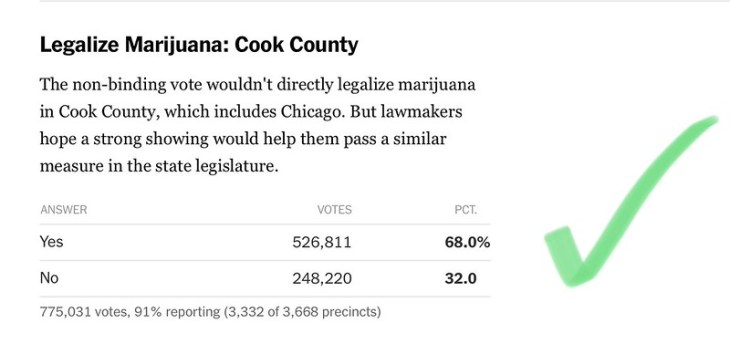Chicago Tribune reports:
A measure that could dramatically expand access to medical marijuana in Illinois — making it available as an opioid painkiller replacement and easing the application process for all who qualify — was signed into law by Gov. Bruce Rauner on Tuesday.
The new law is a response to the epidemic of overdose deaths from narcotics, which killed almost 2,000 people in the state in 2016 and an estimated 72,000 people nationwide last year. It would allow doctors to authorize medical marijuana for any patient who has or would qualify for a prescription for opioids like OxyContin, Percocet or Vicodin.
…
No longer will any applicants have to be fingerprinted and undergo criminal background checks. And those who complete an online application with a doctor’s authorization will get a provisional registration to buy medical cannabis while they wait for state officials to make a final review of their request.
…
[Dr. Nirav Shah, director of the Illinois Department of Public Health] said the elimination of background checks and fingerprinting for applicants goes into effect immediately, and all patients may now get provisional approval to buy medical marijuana immediately upon receiving a receipt for payment from the state health department.
But it will take the state until Dec. 1 to implement all the new rules for the program, and will take until early next year to develop a new system to monitor the program to make sure that opioid replacement patients don’t go to multiple dispensaries and don’t buy marijuana for more than 90 days at a time. The 90-day period can be renewed by patients’ doctors.
Patients who qualify for medical marijuana for something other than opioid replacement can maintain their authorization for three years.
(click here to continue reading Rauner signs medical marijuana expansion bill allowing drug as painkiller alternative – Chicago Tribune.)
And Rauner, being Rauner, changed the period of this access from 1 year to 90 days.

Legalize Marijuana: Cook County
Also, this seems like an important distinction for the upcoming election:
The pilot medical cannabis program is due to expire in July 2020. But state lawmakers have proposed legalizing recreational marijuana next year for those over age 18. The Democratic candidate for governor, J.B. Pritzker, supports the measure, while Rauner opposes it.













